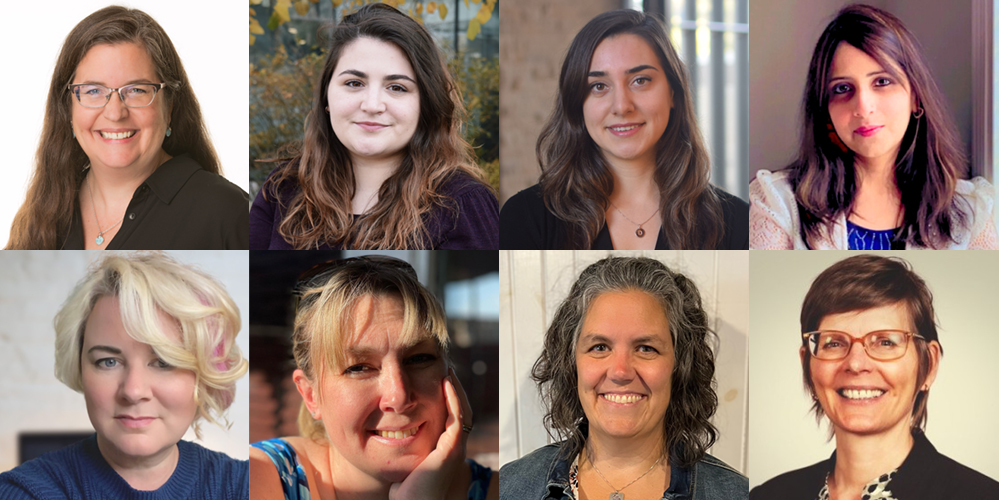Exploring the Need for and Implementation of Virtual Parent-led Peer Support Groups for Parents of Youth with Eating Disorders
Current and Future Impacts

At a glance
Issue
The COVID-19 pandemic negatively impacted families affected by eating disorders.
Research
With CIHR funding, this research team is taking a research co-production approach to develop and implement a national virtual parent-led peer support group (vPLPSG) for parents of youth with eating disorders using an implementation science approach.
Impact
Parent facilitators gained an increased sense of self-efficacy as a result of leading support groups. This team continues to build the evidence base for vPLPSGs by exploring barriers to implementation and examining the health outcomes of parents who participate in this program.
Case study contributors
- Jennifer Couturier, Principal Investigator (Department of Psychiatry and Behavioural Neurosciences, Faculty of Health Sciences, McMaster University, Hamilton, ON)
- Maria Nicula, Research Assistant (Department of Psychiatry and Behavioural Neurosciences, Faculty of Health Sciences, McMaster University, Hamilton, ON)
- Danielle Pellegrini, Research Coordinator (Department of Psychiatry and Behavioural Neurosciences, Faculty of Health Sciences, McMaster University, Hamilton, ON)
- Sadaf Sami, Research Assistant (Department of Psychiatry and Behavioural Neurosciences, Faculty of Health Sciences, McMaster University, Hamilton, ON)
- Shaleen Jones, Project Stakeholder and Collaborator (Eating Disorders Nova Scotia, Halifax, NS)
- Tracey Bartie – Parent Facilitator (Living in Grace Foundation, Calgary, AB)
- Jennifer Starratt - Parent Facilitator
- Alyssa Blais - Parent Facilitator
In October of 2021, we received funding through the CIHR-IHDCYH Operating Grant: Understanding and mitigating the impacts of the COVID-19 pandemic on children, youth and families in Canada to conduct our project entitled "Understanding and Mitigating the Impact of the COVID-19 pandemic on Children, Youth, and Families living with an Eating Disorder: A National Implementation Study of a Virtual Parent-Led Peer Support Intervention". This project is organized into two integrated parts.
First, we set out to interview 70 stakeholders (youth, parents, clinicians, and program administrators) across Canada to understand the impact of the pandemic on youth and families living with eating disorders. As part of these interviews, we explored peer support as an approach to help mitigate impacts on all stakeholders, specifically virtual parent-led peer support groups (vPLPSGs) for parents, given our previous Ontario-based study on this (Grennan 2022; Nicula 2023). We have found the COVID-19 pandemic has had a profound impact on families affected by eating disorders, and that opinions towards the vPLPSGs were largely positive.
For the second part of our study, we implemented three vPLPSGs across Canada as a way of mitigating the impact of the COVID-19 pandemic on families affected by eating disorders. These groups are still ongoing, so data collection is not complete. However, the feedback we are receiving from parents in the groups is very positive.
Current understanding of the key benefits of a national virtual parent-led peer support intervention

Parent facilitators, stakeholders, and research team members who were involved in the project all reported that they were positively impacted by this study. Parent facilitators gained an increased sense of self-efficacy and felt helpful when supporting parents of children and adolescents with eating disorders. The research team viewed this successful project as another crucial step in building the evidence base for these vPLPSGs. Additional research, in the form of a randomized controlled trial or another more rigorous pragmatic trial design with a control group, will help us avoid or address barriers in establishing and advocating for vPLPSGs to be implemented at pediatric hospitals across Canada.
Highlighting the expertise underlying the research program
This project builds upon a smaller-scale Ontario-based project with the same goal of building an evidence base for vPLPSGs for parents of children and adolescents with eating disorders. In this smaller study, we assessed the feasibility of this intervention and captured parents’ perspectives of and experiences with the intervention.
In assembling the team for the present project, we reflected on some of the feedback from our previous study to implement formal training for the parents who were facilitating the groups. For this, we collaborated with Shaleen Jones and her team at Eating Disorders Nova Scotia. This allowed us to develop a standardized training program for parent facilitators.
In this training, we recruited 10 parent peer support facilitators who received a 5-week training on how to lead support groups for parents who were caring for this patient population. All parent peer support facilitators had lived experience caring for an adolescent with an eating disorder. Eight of these parents went on to lead the groups and three of them provided their insights for this case study: Tracey Bartie, Alyssa Blais, and Jennifer Starratt.
The research team who made this project possible included Sadaf Sami, Danielle Pellegrini, Laura Grennan, and Maria Nicula and were led by Dr. Jennifer Couturier (Principal Investigator). Dr. Couturier is a child and adolescent psychiatrist and medical co-director of the eating disorders program at McMaster Children’s Hospital. She is an associate professor at McMaster University and has extensive research expertise in implementation science. The idea to study parent-led peer support groups arose due to a need identified by parents within the eating disorders program at McMaster Children’s Hospital.
Understanding the details of the impact
First of all, there was an impact on the parent facilitators’ self-efficacy to help others and to help themselves. One parent facilitator stated: “After being able to help others, I am better able to appreciate and be confident in my [child’s] recovery.” Additionally, parent facilitators felt as though they made a positive impact on the other parents, as shared by one facilitator: “I think the parents really benefitted from the support they received with each other facilitated by the peer supporters.”
Our collaborator who built the training program, Shaleen Jones, expressed that the training program created as a team is a tangible takeaway that will help us to scale and spread vPLPSGs wherever and whenever necessary.
Ultimately, the general attitude when asked about the impact of the project is very positive. As one facilitator stated: “I do wish there was some way to bring these stories to hospitals or policy makers, because there is such a range in experiences, and it seems like care is changing and [is] not as accessible as it has been. That makes me very nervous and sad for families having to support a child through an eating disorder.” Currently, there are a number of barriers and obstacles that may make it difficult to implement these groups right away, such as “finances, staff shortages, and overall country and political policies in the healthcare sector”, as mentioned by a research staff member.
Altogether, members of our research team shared that, for these groups to be formally implemented out of each pediatric eating disorder program in hospitals across Canada, more research—such as a clinical trial—is needed to prove that child and parent outcomes improve when parents are involved in vPLPSGs. One research team member shared: “… longer-term change would be more funding for a trial, so that we can really prove the effectiveness of this intervention. The current healthcare system and funding structures are what are impacting the desired long-term impact of our intervention, which is that these groups run out of each hospital program so that parents could have a group to talk to at each hospital. But, we need additional funds to conduct research and the knowledge translation of these groups, when implemented, to be able to do that.”
Collecting the evidence for research impact
Although we are in the midst of data analysis for the current project, our research team feels very strongly that the preliminary quantitative and qualitative findings run in alignment with our research team’s previous studies that highlight the value of vPLPSGs. Our interviews with stakeholders and researchers demonstrate the positive impact that our project has had on our participants and our team.
Another way we see the impact of our research is that we have many parents who are showing interest in the study to participate in the groups. Our previous Ontario-based study where we assessed the feasibility of these groups has continued; the facilitators established their own virtual parent-led peer support group network to ensure that the parents in their groups continue to receive the support they need. This speaks to the passion that the facilitators from the previous and current study have regarding the time, effort, and dedication they commit to these groups.
The role of knowledge mobilization activities in contributing to the impact
We are in the process of preparing the data from both aims of our project for an academic conference; the first paper presentation will be a qualitative report led by Cheryl Webb, summarizing the perspectives of stakeholders about virtual parent-led peer support, and the second paper presentation will be a mixed methods summary led by Maria Nicula, about the fidelity and experience of the eight facilitators of the virtual parent-led peer support groups to date.
In addition, work from both arms will be submitted to high-impact, academic eating disorder journals.
Further, our learnings from this project will help to inform a future grant submission where we plan to rigorously test the effectiveness of our peer support intervention through a randomized controlled trial or a pragmatic trial design with a control group. Paired with our scaled-up program of research over the years, we believe that such a trial would be the final research result to advocate for the implementation of these groups at hospitals providing pediatric eating disorder treatment to Canadian families, so that parents can support their children and receive support for themselves.
Further reading
- Grennan, L., Nicula, M., Pellegrini, D., Giuliani, K., Crews, E., Webb, C., Gouveia, M.-R., Loewen, T., & Couturier, J. (2022). “I’m not alone”: a qualitative report of experiences among parents of children with eating disorders attending virtual parent-led peer support groups. Journal of Eating Disorders, 10(1), 195.
- Nicula, M., Grennan, L., Loewen, T., Crews, E., Giuliani, K., Webb, C., Gouveia, M. R., & Couturier, J. (2023). Virtual parent‐led peer support groups for parents of children with eating disorders: A mixed methods feasibility study. International Journal of Eating Disorders. 56(11).
- Hannah, L., Cross, M., Baily, H., Grimwade, K., Clarke, T., & Allan, S. M. (2021). A systematic review of the impact of carer interventions on outcomes for patients with eating disorders. Eating and Weight Disorders-Studies on Anorexia, Bulimia and Obesity, 27.
- Ohara, C., Nishizono-Maher, A., Sekiguchi, A., Sugawara, A., Morino, Y., Kawakami, J., & Hotta, M. (2023). Individualized peer support needs assessment for families with eating disorders. BioPsychoSocial Medicine, 17(1), 11.
- Agostino, H., Burstein, B., Moubayed, D., Taddeo, D., Grady, R., Vyver, E., Dimitropoulos, G., Dominic, A., & Coelho, J. S. (2021). Trends in the incidence of new-onset anorexia nervosa and atypical anorexia nervosa among youth during the COVID-19 pandemic in Canada. JAMA network open, 4(12), e2137395-e2137395.
- Toulany, A., Kurdyak, P., Guttmann, A., Stukel, T. A., Fu, L., Strauss, R., Fiksenbaum, L., & Saunders, N. R. (2022). Acute care visits for eating disorders among children and adolescents after the onset of the COVID-19 pandemic. Journal of Adolescent Health, 70(1), 42-47.
- Date modified: